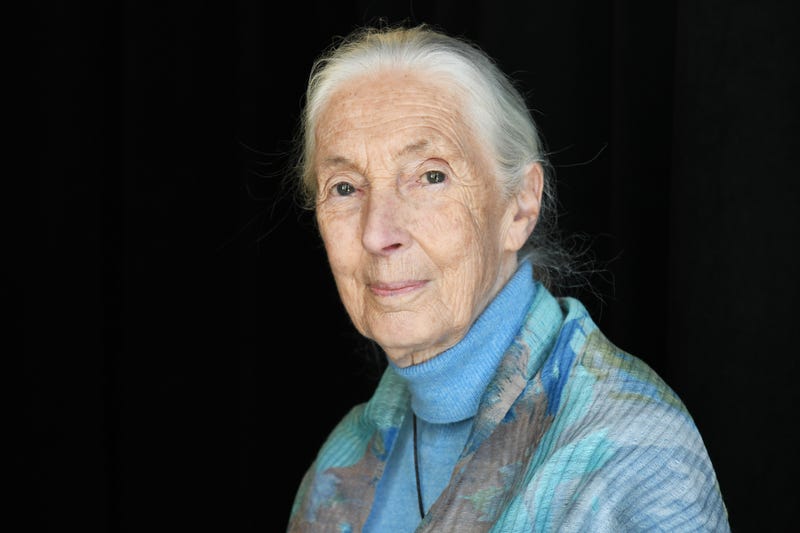
Famed primatologist Jane Goodall, who was scheduled to appear at an event Wednesday Pasadena, has died at age 91 from natural causes.
According to the Jane Goodall Institute, she "passed away due to natural causes.
"She was in California as part of her speaking tour in the United States," according to a statement posted on social media by the Jane Goodall Institute. "Dr. Goodall's discoveries as an ethologist revolutionized science, and she was a tireless advocate for the protection and restoration of our natural world."
Goodall had been scheduled to speak at a late-morning event Wednesday at EF Academy in Pasadena to announce a student-led effort to plant more than 5,000 trees in the fire-ravaged Pacific Palisades and Altadena communities over the next three to five years. The effort, known as TREEAMS, was a partnership including EF Academy Pasadena, Saint Mark's School in Altadena and dozens of other schools, along with organizations such as UCLA School of Education, SoLa Foundation and EcoRise.
The event announcing the program went on as scheduled without Goodall. Erin McCombs of the Jane Goodall Institute spoke on her behalf. Event organizers also showed a video in Goodall's memory, which was filmed in 2015 at the EF Global Student Leaders Summit in Costa Rica.
In a prepared statement issued before the event, Goodall said, "The TREEAMS movement represents the very best of what young people can achieve when they come together with courage and compassion. By planting trees, they are helping restore ecosystems, combat climate change, and bring healing to communities in need."
Shawna Marino, vice president of EF Academy, told City News Service in an email the tree-planting program "is an important part of (Goodall's) incredible legacy."
Goodall, a lifelong advocate for the protection of endangered species, is best known for immersing herself into the habitat of chimps in Tanzania's Gombe National Park in the 1960s, documenting the personalities of individual chimpanzees and their human-like characteristics.
Only in her 20s at the time, Goodall gained fame for the close relationship she formed with the chimps she was studying, even finding herself accepted as a member of a particular group of the animals for nearly two years.
In 1977, she founded the Jane Goodall Institute, a nonprofit organization that "empowers people to make a difference for all living things."
In 1991, she worked with a group of students in Tanzania to form Roots & Shoots, which is the Institute's global environmental and humanitarian youth program.
Want to get caught up on what's happening in SoCal every weekday afternoon? Click to follow The L.A. Local wherever you get podcasts.
"Through nearly 60 years of groundbreaking work, Dr. Jane Goodall has not only shown us the urgent need to protect chimpanzees from extinction; she has also redefined species conservation to include the needs of local people and the environment," according to the Institute.
Her discovery during her time in Tanzania that chimpanzees make and use tools "is considered one of the greatest achievements of 20th Century scholarship," according to the Institute's website.
"Her field research at Gombe transformed our understanding of chimpanzees and redefined the relationship between humans and animals in ways that continue to emanate around the world."
Goodall received the Presidential Medal of Freedom, the nation's highest civilian honor, from then-President Joe Biden in January.
"This recognition reflects the hope and action of so many people who inspire and motivate me every day in the firm belief that together we can and we must save the natural world for ourselves and future generations," Goodall said in a statement when the honor was announced.
Goodall was the grand marshal of the 2013 Tournament of Roses Parade.
Goodall was born in London on April 3, 1934, and became fascinated by animals as a child by reading stories such as Tarzan and Dr. Doolittle. Her prized possession as a child was a stuffed toy chimpanzee named Jubilee. Goodall's mother once said she found her daughter at a young age lying in bed with a group of earthworms, trying to learn how they were able to move without legs. She also once hid in a henhouse for several hours so she could watch a hen lay an egg.
At the invitation of a friend, she traveled to Kenya in 1957 and met paleoanthropologist Louis Leakey, and it was under his tutelage that Goodall began her study of chimps in Tanzania.
The Jane Goodall Institute has two dozen locations around the world, continuing her groundbreaking chimpanzee research and conservation efforts.
Follow KNX News 97.1 FM
